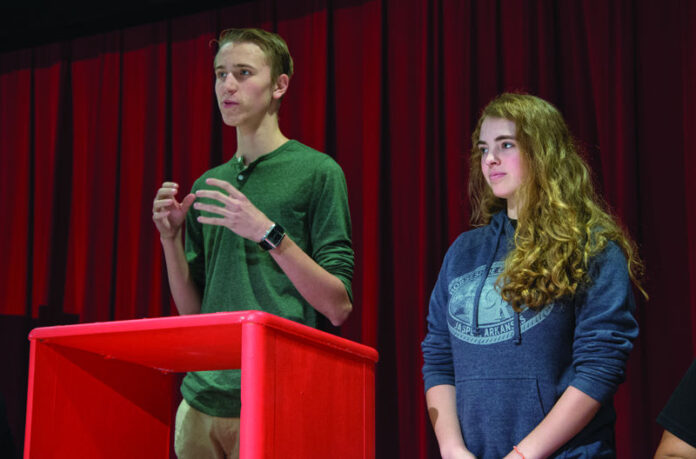HARLINGEN — Grant Burbach stood at the podium defending his position on gun control, insisting there should be more restrictions.
“I think it’s too easy for the wrong people to own guns,” said Grant, 16, a sophomore at Harlingen High School. Background checks should include searches for nonviolent crimes such as stalking, which often escalate to violent crimes, he said.
“Do you think this will deter good people from actually getting guns?” fired back Irene Tyler, 15, a member of the school’s Speech, Drama and Debate Team like Grant.
A volley of heavy declarations and stinging challenges shot back and forth in rapid succession for 10 minutes before they concluded their practice session.
Irene and Grant were preparing to compete in the Harvard Invitational Meet next month along with five other students under the direction of their coach and sponsor, Tasha Kneis. Irene is competing in the Lincoln Douglas event, and Grant is competing in Congressional Debate. Others are competing in original oratory, extemporaneous speaking and dramatic performance.
Students are feeling the pressure.
“I am very excited to go to Harvard,” said Irene, a sophomore. “I haven’t gone on a big trip with the debate team. Everyone is working hard and it’s a bit nerve-wracking.”
Kneis, who also teaches speech, drama and debate, said she was proud of the students’ hard work.
“Oh, we’re really excited,” she said. “I think that their talent level is nationally competitive now, so we’re excited to give them that exposure. They know so much about issues happening around the world.”
Grant is the most recent example of the successes of Kneis and her students. He’d just placed 10th in the UIL State Congress Meet in Austin earlier this week.
His bill was called, “Should We Send Soldiers to Latin America to Promote Humanitarian Aid and Peace.”
“I got to give the first speech to introduce the bill and then debate it,” he said. “The questions, most of them poked holes in the speech.”
He had to fend off a barrage of questions from about 20 or 30 people in a mock congress.
He loves the Congressional Debate event because it’s the most “real-world example of debate,” he said.
“It’s one of the most pure forms of debate that we have,” he said.
Irene prefers the Lincoln-Douglas Debate event because it’s a one-on-one match.
“With Lincoln-Douglas, it’s a lot more focused, more in-depth about the topic,” she said.
Preparation involves intense research about the topic and learning enough to defend both sides of the argument.
“We also have to have evidence that would block other people’s cases and prepare for what someone else might say,” she said.
She had to have sources she could reference for each point she’d make in the event. Most of those sources were online, but they had to be reputable. She used the Violence Policy Center, NRA and the FBI websites, along with many others.
Not only has she thoroughly researched her topic, she’s also practiced defending it. She and her other teammates have been debating each other to hone their skills.
Irene said debate differs from arguing. The debater must understand a topic thoroughly enough to defend either side, even the one with which he or she disagrees. Irene comes from a conservative background and had difficulty learning to debate in favor of something she doesn’t agree with. She said debate forced her to reach beyond her comfort zone. As a result, she now understands the issue much better.




